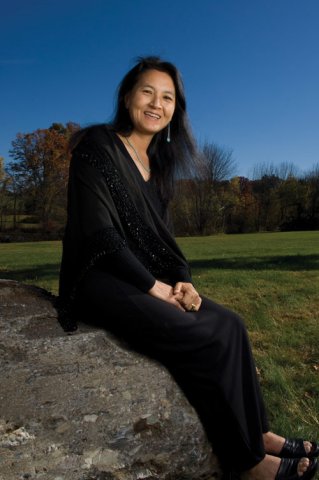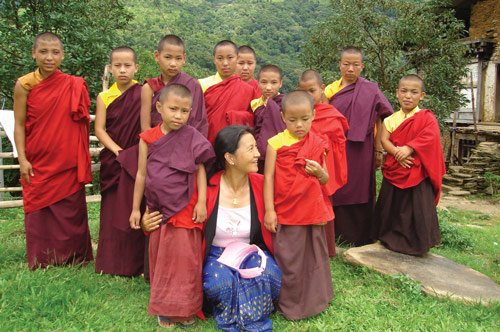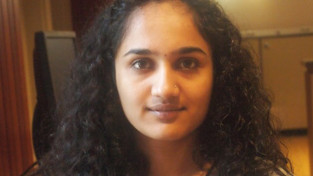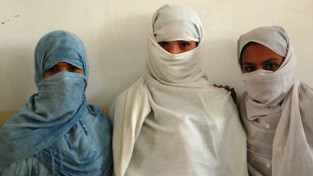Humble Crusader: Tashi Zangmo FP’99 Promotes Female Education in Bhutan

Girls never went to school when Tashi Zangmo FP’99 was growing up in a remote corner of Bhutan. She’s working to change that. (Photo by Ben Barnhart)
When Zangmo was growing up in one of the most remote corners of mountainous Bhutan, she says, “girls never went to school.” She was the first girl ever sent to school from her community. Her father was a community spiritual teacher, but her mother was illiterate, and Zangmo recalls the decision to send her to school as “a big leap for my mother and me. The only school was a one-day walk from my village,” so the nine-year-old Zangmo left her family and moved there. “I had to room with boys, the teachers weren’t used to working with young girls … it was a horrible experience, but that’s not important,” Zangmo says.
What is key is that those early classroom days inspired the adult Zangmo to help other girls have a better experience than she had. “Even when I was making hardly enough money to feed myself, there was a vision that I could do something down the road to help girls get a better education in communities similar to mine. I want to be a role model,” she says.
At first, Zangmo envisioned just helping her seven siblings, but as her own education progressed, she says, “my vision grew from family to community, and now I think of how I can serve my country best.”
Although Zangmo humbly deflects credit for her ideas, her goal is nothing short of changing Bhutanese society by improving girls’ education. After receiving her doctorate from UMass–Amherst this past December, she moved back to her homeland and founded the Bhutan Nuns Foundation, under the patronage of Queen Ashi Tshering Yangdon Wangchuck.
To grasp why supporting nuns’ education also means educating girls generally, it helps to understand evolving Bhutanese beliefs about girls and education.
A 2002 estimate by UNESCO held that twice as many boys as girls attend school in Bhutan, putting the rate of girls in school at just 10 percent. Since then, access to primary education has been a royal priority. According to UNICEF, the number of students has more than doubled since 1990, and girls’ enrollment is expanding steadily. However, significant gender gaps remain in practice. Often, students still must travel considerable distances to find a school, and tradition holds that girls and women should stay near their families.
Zangmo’s plan? Since you can’t easily bring all girls to a school, take schools to the girls. With Buddhist nunneries in many rural locations that lack schools, that’s where her efforts are focused. Nunnery-based education also has the advantage of being free. (Government-run schools require families to pay for uniforms and supplies. This makes schooling beyond the reach of many, especially families with numerous children.) And working with nuns seemed natural to Zangmo, a practicing Buddhist who says she comes from “a very spiritual family.”
“Nunneries [already] provide women from all walks of life with an educational opportunity that has no age or learning capacity limit, as the formal education sector does,” she explains. “If the nunneries provided good education, nuns and other girls and women coming to the nunneries would be empowered and be in a better position to contribute to their communities,” Zangmo reasons. “Nuns in turn could become teachers and social workers within their villages and their nunneries, and contribute to the larger national development goal of raising ‘Gross National Happiness.’”
The problem is that nunneries, while often one of few alternative educational institutions open to females, typically provide a very poor learning environment, Zangmo says. “In some, there is no electricity, no bathrooms, no curriculum, no qualified teachers—nothing.” Still, it’s often the only game in town, so there are about five times as many girls seeking admission as there are openings, Zangmo estimates. Sadly, those admitted are likely to gain little academic substance from the country’s 800 to 900 nuns. “It breaks my heart to have families send their children there with the hope of learning only to discover that there are no learning facilities,” she says. “But something can be done. My vision is to give the nuns teacher training.”
And the first glimmers of this vision took shape at Mount Holyoke, where Mary Lyon’s goal was similar. “I had no clue what Mount Holyoke College was all about when I applied,” Zangmo admits. “But I read Mary Lyon’s book, and it really spoke to my heart. Professor Penny Gill used to say, ‘Mary Lyon calls you,’ and that helped me articulate my vision.”

Tashi Zangmo FP’99 visits with young nuns in Southeastern Bhutan duringa 2007 research trip. She hopes to train nuns to teach other girls inthis modernizing country. (At MHC she was a special major in developmental studies.)
Zangmo started helping the nuns back home more effectively during her time at MHC. Babysitting earnings bought clothing and better drinking water for the nuns in her native village. She used a $10,000 Samuel Huntington Public Service Award to start a small library there, and Zangmo spent about two years teaching adult literacy classes in Bhutan after her graduation. In 2005, the minister of home and cultural affairs in Bhutan heard of Zangmo’s efforts, and asked her to propose a systematic way to improve girls’ lot. She brought him a proposal on notebook paper and, with the minister’s support, came up with the beginnings of the Bhutan Nuns Foundation.
Back in the US for her PhD work, Zangmo formed an advisory group and raised seed money for the foundation. She launched it officially this winter by moving back to Bhutan, opening an office, and hiring a coworker. “There is a lot to be done!” she says, reciting a litany of goals that include improving nuns’ living conditions, building a structured curriculum, training nuns to teach both at the nunneries and in the public school system, and creating a higher-learning center open to all women.
“Ten years from now, I envision that the foundation will have improved the lives not only of the nuns but also of every girl and woman in Bhutan,” she says.
There was no such help when Zangmo wanted to further her own education. After high school
-level studies, Zangmo knew that, in Bhutan, “unless I became a nun, there was no opportunity for me to do further Buddhist studies.” She had to break with tradition, earning money in a secretarial job for the government, then leaving her family and moving to India, where she studied Buddhist philosophy. “My family said, ‘Why would you leave that [job] and go?’ I said, ‘Don’t worry, I’ll do even better than this!’” She earned a BA in India, then completed a second bachelor’s degree at MHC.
While her own educational track was rare and radical, Zangmo believes that her country is now ready for sweeping advances that will enhance education for all girls and enlarge the nuns’ role in society. “While respecting and preserving our traditional culture, we cannot expect the nuns to stay where they were centuries ago,” Zangmo says. “The whole country is moving toward modernization and globalization, and we want to include nuns as part of the development agenda so they’re not left out in the twenty-first century. This is especially true since preserving culture, spirituality, and tradition is one of the common threads within Bhutanese society and one of the main pillars of ‘Gross National Happiness.’”
With help from her royal patron, government officials, donors, and her own true grit, Zangmo seems poised to, as Mary Lyon advocated, “go forward, attempt great things, accomplish great things.”
—By Emily Harrison Weir
This article appeared in the spring 2009 issue of the Alumnae Quarterly.
Learn More by visiting www.bhutannuns.org or read a transcript of our interview with Tashi below.
The text below is an edited version of a transcribed conversation between Alumnae Quarterly editor Emily Weir and Tashi Zangmo in fall2008.
What do you hope will be accomplished by the Bhutan Nuns Foundation?
There are so many little nunneries in every tiny corner of the country. Last summer I realized they don’t have proper teachers, have no curriculum, and the living conditions are very poor, so we are hoping to create a higher learning center which is open to all the nuns in Bhutan.
My vision is to create and teach training for the nuns, teaching leadership training, teacher training, all kinds of things [to benefit the] kids. When the whole country is moving toward development and it’s moving toward modernization and globalization, we cannot expect [the nuns] to stay the way they are. We have to help them move beyond…of course, while respecting and preserving our tradition and culture.
How does the Buddhist religion factor into the program?
I don’t want to change the whole thing, what the nuns are doing. I’m focusing more on the education side, because I don’t have to emphasize strong religious needs; [the nuns] already do that. I come from a very spiritual family, and I am a practicing Buddhist. That’s the main reason that I think I am more inclined to help the nuns.
Why is it so rare for girls to have access to education in Bhutan?
Education is ‘free’ in my country, but then families must buy the uniform, pay school fees, and buy books. All that costs a lot; how many families can afford to do that?
There’s no such rule as “girls cannot go to school,” but by the nature of the country’s geographic location—it is a mountainous country—not every village has a school that is available and conducive to learning. Those are some of the barriers that kept girls away from school, and still it’s happening in the most rural areas.
It’s improved a lot since I went to school, but still we face difficulties because the schools that are located in rural villages are often far away from the [students’] villages—they have to walk at least one hour—so that becomes a difficult thing for the girls.
If a family has five girls, not every girl gets to go to school. There is still some belief that, you know, she’s a girl, so she can stay home and help the mother and that kind of thing. [This traditional view is] still there, even though it’s moved a lot beyond that notion that girls don’t need an education.
What was school like for you in Bhutan?
I came from a very small village in one of the most remote corners of Bhutan, and at that time, no girls ever went to school. From that community, I was actually the first girl-child sent to school.
I think the timing was right [for me to attend school], because in the village my mother saw a couple of local girls were attending school. I can remember only about five girls who were going to that school at that time, out of 200 boys or something.
The only school was a one-day walk from my village. And as a little girl, I started at a boarding school because there was no way I could commute. Since I was the only one who came from faraway village, I started by sharing a room with the boys. They were not organized; the teachers were not ready.
So, a year or two later, more girls started attending school. I was kind of a role model, I think. Now there are so many who go to school, but [most don’t go as far educationally] as I went.
After I finished high school, I started working as a secretary [in the city]. I wanted to study Buddhist philosophy, but then, they didn’t have opportunities for young women like me. Unless you become a nun, there is no opportunity to really study. And I went to India for [further education].
When I was leaving the secretary job [to attend college], I was the only daughter in my family working in the government; it’s a big deal. My family was in shock, [saying] ‘why would you leave that job and go away?’ And I said, ‘don’t worry, I’ll do better than this.’ I finished there and I got my BA degree in Buddhist philosophy. And [MHC] was my second BA.
At that time I was hardly making enough money to feed myself, but somehow in my mind I felt there is something that I can do down the road. I never dreamt of coming to this part of the world. But somehow there was something telling me that there’s something out there that I can do.
How do the nuns feel about the Bhutan Nuns Foundation?
I met with every senior official, every senior monk, and every nun, and with village women. There was a sense that everybody saw the need [for change].
I was being very careful about not trying to put my own ideas into their heads. The nature of questions that I would ask [the nuns] was, ‘what would you wish to have?’ Every nunnery could use every kind of help. But there are many nunneries that need the very basics…they lack basic minimum comforts—no electricity, no bathrooms … no health and hygiene, nothing.
I would ask, ‘if you were given opportunity to study, what would you want to learn?’ or ‘How would you imagine yourself having a better education?’ They were never faced with these kinds of questions before. Nobody cared to have conversations with them or ask them what their needs are, so it was very hard for them to articulate [answers]. They had to trust me to talk about these kind of things.
The majority of them told me that they would like to have … a very structured curriculum, qualified teachers, and to have Buddhist scholars come and teach. But at the same time they were really desiring nun teachers, so they would be comfortable, have some commonalities, and have a mutual understanding for each other.
How did your time at Mount Holyoke contribute to your vision for the BNF?
I had no clue what Mount Holyoke College was all about when I applied. When I came here, I read Mary Lyon’s book [A Missionary Offering] and thought, gee! Mary Lyon really wanted me to come here. Mount Holyoke spoke to my heart and it really helped me to articulate my visions, which I never used to be able to articulate. After coming here, I was able to move forward with that vision, and now I have nuns who are benefitting the community and especially the community of women and families.
Even when I was at Mount Holyoke, I did a little bit of fundraising for the BNF … I supported them whatever little way I could. I used to do a bit of babysitting [while in college] to earn some money. I saved it, then used it to send them clothing—robes for the nuns. One year I did a fundraising Bhutanese dinner in the Berkshires with my friends. [That money funded a] drinking water supply for the nuns. [My efforts] really grew after I came to Mount Holyoke.
April 13, 2009









